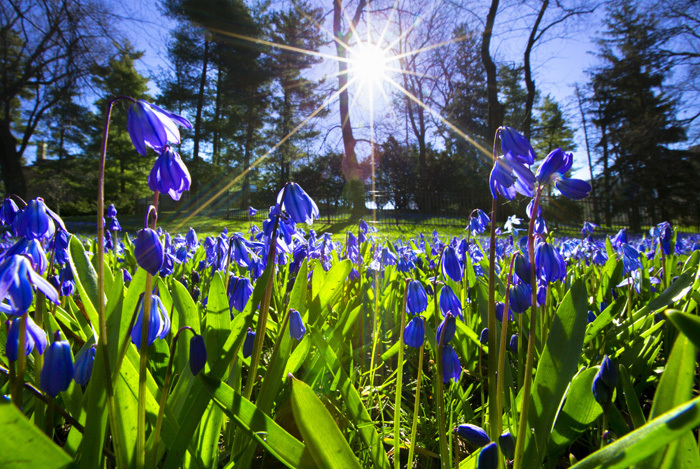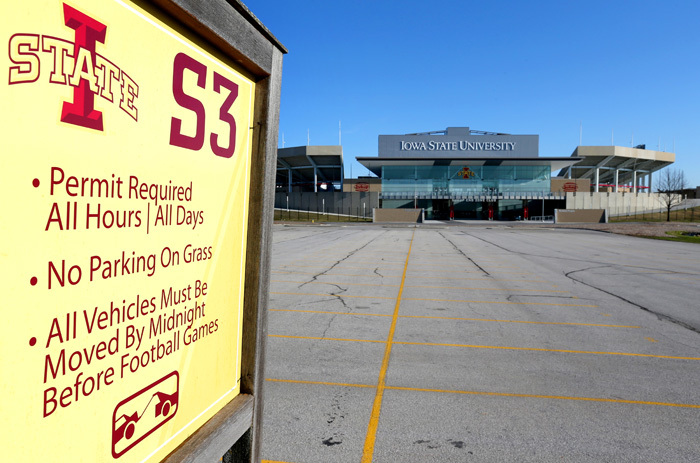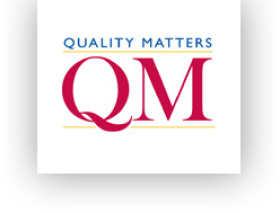Purple carpet

Photo by Christopher Gannon.
One of the first plants to announce spring's arrival in central Iowa, this patch of Siberian squill west of The Knoll welcomes the morning sun.
Search for senior VP for university services on fast track
A national search is underway to hire Iowa State's first senior vice president for university services. The new post is part of President Steven Leath's reorganization of the university's business and financial operations.
ISU Foundation senior vice president of finance and operations Lisa Eslinger and College of Business dean David Spalding are leading the search, which will be conducted on an ambitious timeline.
The goal is to bring finalists to campus for visits in early May and have a new SVP on board by July 1, when current senior vice president for business and finance Warren Madden retires.
The reorganization, announced by Leath last week, splits the large SVP for business and finance office into two divisions -- the division of university services and the division of finance. The senior VP for university services will oversee seven units: facilities planning and management, business services, environmental health and safety, public safety, Reiman Gardens, University Museums and WOI radio group.
The remaining units will report to the division of finance, led by Miles Lackey, who will retain his current post as the president's chief of staff and assume the new role of chief financial officer.
How to apply
Posting information and application instructions for the senior vice president for university services are available online. To guarantee consideration, applicants should apply by April 28. However, applications may be submitted until the position has been filled.
Search committee
Co-chairs
- Lisa Eslinger, senior vice president of business and operations for the ISU Foundation
- David Spalding, dean of the College of Business
Members
- Veronica Dark, professor of psychology and past president of Faculty Senate
- Pete Englin, director of the department of residence
- Chris Jorgensen, senior associate director of athletics
- Reginald Stewart, vice president for diversity and inclusion
- Tera Lawson, program coordinator in the Center for Technology in Learning and Teaching and president of the Professional and Scientific Council
- Sarah Nusser, vice president for research and professor of statistics
- Julie Nuter, vice president for university human resources
Korn Ferry, an international executive search firm, will assist in the search.
Related stories:
- Leath to reorganize business, financial operations, March 24, 2016
- Cyclone nation ovation (Warren Madden), Feb. 4, 2016
Third HS dean finalist will visit April 5-6
The third finalist in the search for the next dean of the College of Human Sciences will visit campus April 5-6. Stephan ("Steven") Wilson currently serves as a Regents Professor of human development and family studies and dean of the College of Human Sciences at Oklahoma State University, Stillwater.
Wilson's public forum with the university community is scheduled for Tuesday, April 5 (4-5 p.m., 0210 Bessey).
The other two finalists, Cheryl Hanley-Maxwell, University of Wisconsin, Madison; and Laura Jolly, University of Georgia, Athens, visited campus earlier this month.
About Wilson
Wilson joined the Oklahoma State faculty as dean in 2008. Previously, he held faculty/administrative posts at the University of Nevada, Reno (2002-08); University of Kentucky, Lexington (1991-2002); Virginia Polytechnic Institute and State University, Blacksburg (1989-91), Illinois State University, Normal (1988-89) and Montana State University, Bozeman (1987-88).
He served as a U.S. Peace Corps volunteer in Kenya (1977-78) and later returned (2000-01) as a senior Fulbright professor in residence at Kenyatta University, Nairobi.
Wilson earned a bachelor's degree (1976) in biology and philosophy from Wabash College, Crawfordsville, Indiana; and a master's degree (1981) in child and family studies and doctoral degree (1985) in family relations and human development, both from the University of Tennessee, Knoxville.
More information
Vitae for the finalists, as well as a feedback form, are available on the provost office's position search website.
Dean Pam White announced in August her plans to retire this July.
Related stories:
- Second HS dean finalist announced, March 24, 2016
- Campus visits scheduled for three Human Sciences dean finalists, March 10, 2016
- Committee named for Human Sciences dean search, Oct. 8, 2015
- White announces retirement, Sept. 3, 2015
Stadium-gardens link improvements begin in April

Lot S3 will be removed this spring as part of plans to redevelop the area between Jack Trice Stadium and Reiman Gardens. Photo by Christopher Gannon.
The second phase of the football stadium expansion, an $11.5 million development of about 10 acres between the south end of the stadium and Reiman Gardens, will begin next month. One part of the project involves removing the parking lot (S3) immediately south of the new end zone club facility, shortening the lot on either side of it and replacing the entry road to Reiman Gardens off of University Boulevard. A drainage ditch running along the north perimeter of Reiman Gardens will be converted to an underground drainage pipe and a new ground-level sign installed for the gardens.
This work is anticipated to begin in mid-April and wrap up by mid-August, in time for the football home opener on Sept. 3. It will eliminate an estimated 400 parking spaces from the stadium south lots.
Reiman Gardens' primary entrance off of University Boulevard will close for a time in early summer while crews reconfigure the intersection. During this time, visitors will access the gardens and parking lot from the Beach Avenue driveway.
Green link
The other part of the project, for which the design isn't finalized yet, will create a landscaped green space and plaza on the S3 parking lot site as a visual link between the stadium and gardens. The plaza is expected to include some variety of water feature and formal and informal gathering spaces. This work also will improve lighting south of the stadium and create a landscaped buffer between the parking lot designated for garden visitors and other stadium lots.
Project manager Jon Harvey, facilities planning and management, said he anticipates the landscaping component will begin sometime this fall, with final plantings installed in spring 2017. He said this work would not greatly impact stadium game days this fall.
Earlier work
Completed last August, phase 1 bowled in the south end of Jack Trice Stadium, creating a new south entrance, indoor club facility and continuous permanent seating on the lower level, and adding upper-level seating in the south corners. The project also added more concourse-level restrooms, a larger south video board and an electronic ribbon board around the stadium.
The two phases, totaling $60 million, will be covered by a $32 million bond sale (February 2015) and $28 million in athletics department annual revenues and private gifts.
Related stories:
- Reiman Gardens launches 20-year master plan, Jan. 28, 2016
- Stadium completion on track for football opener, May 28, 2015
- Stadium project is cruising toward football home opener, Jan. 29, 2015
- Football stadium plans clear final hurdle, June 5, 2014
Quality Matters for online courses

The Center for Excellence in Learning and Teaching (CELT) is offering a new professional development opportunity for instructors interested in improving their online classes and possibly receiving certification through Quality Matters, a nationally recognized certification process of online course design.
What is Quality Matters?
Quality Matters (QM) evaluates online courses using a panel of external reviewers who measure classes against eight standards in QM's higher education rubric. The standards are:
- Course overview and introduction
- Learning goals and objectives
- Assessment of student learning
- Instructional materials
- Course activities and learner interaction
- Technology
- Learner support
- Accessibility and usability
Each of these standards consists of additional substandards. The substandards are assigned values depending on their impact on the overall course design. To achieve certification, the online course must achieve a minimum of 85 percent of QM's expectations and also receive full credit for all essential, high-impact standards, as noted in the rubric.
More information
For more information about participating in Quality Matters programming, contact CELT assistant director Allan Schmidt, 294-5357.
How CELT can help
CELT recently launched three new professional development tracks with the goals of not only helping ISU faculty enhance their online courses but also preparing them for the QM certification process. However, faculty who enroll in CELT's QM courses are not required to seek QM certification.
"CELT is focused on what is most beneficial to ISU's faculty and instructional designers when it comes to Quality Matters," said Ann Marie VanDerZanden, director of CELT. "We've provided a forum to help our faculty learn ways to improve their online courses while also getting through the QM courses. Whether or not they choose to certify their courses is up to them."
The three tracks are:
- Basics of online teaching
- Beyond the basics of online teaching
- Universal design for teaching online
Each course within a track takes about two weeks to complete. The QM courses cost between $150 and $300 each. However, CELT will reimburse participants 50 percent of that cost upon successful completion of the course. QM charges $1,000 to certify a course. That cost is paid by the college where the course resides.
Successful certification
So far, Iowa State has one QM-certified online class -- Case Studies IV: Emerging and Exotic Diseases of Animals/Initial Accreditation Training (VMPM 378, EEDA/IAT) in the College of Veterinary Medicine. The course received certification last fall after an 18-month process of internal reviews, tweaks and enhancements. A handful of other classes across campus are in the process of certification.
VMPM 378, EEDA/IAT is used not only at ISU, but components of the course are taken by thousands of students in every veterinary school in the nation. The class, first developed in the early 2000s by Iowa State, the University of Georgia, Athens, and the University of California, Davis, now is managed by an ISU team led Gayle Brown, senior lecturer and veterinary specialist at the Center for Food Security and Public Health in the College of Veterinary Medicine.
"Because we're responsible for keeping this course current and available to all veterinary colleges, we wanted to know that we were providing high-quality online training," Brown said. "We wanted this course to be the best."
She and her team worked with CELT and the Quality Matters organization, conducting internal reviews of the course, making design and content changes based upon those reviews, and taking required online QM courses prior to certification. Brown is pleased with the result.
"The improvements we made to the course as a result of the certification process made the course better for the students, and that's what QM is really all about -- enhancing the student experience," Brown said.
Where's home?
Where Iowa State undergraduates arrive from, by college (Fall 2015)
|
|
Iowa |
U.S. (not Iowa) |
International |
Total |
|
AGLS |
3,359 |
1,147 |
106 |
4,612 |
|
Business |
2,644 |
1,143 |
374 |
4,161 |
|
Design |
1,099 |
459 |
213 |
1,771 |
|
Engineering |
3,853 |
3,235 |
861 |
7,949 |
|
Human Sciences |
3,281 |
917 |
92 |
4,290 |
|
LAS |
5,049 |
1,710 |
492 |
7,251 |
|
Total |
19,285 |
8,611 |
2,138 |
30,034 |
Where Iowa State graduate students arrive from, by college (Fall 2015)
|
|
Iowa |
U.S. (not Iowa) |
International |
Total |
|
AGLS |
227 |
365 |
171 |
763 |
|
Business |
165 |
27 |
132 |
324 |
|
Design |
85 |
49 |
79 |
213 |
|
Engineering |
280 |
301 |
782 |
1,363 |
|
Human Sciences |
341 |
250 |
106 |
697 |
|
LAS |
235 |
433 |
518 |
1,186 |
|
Veterinary Medicine |
294 |
381 |
55 |
730 |
|
DVM |
237 |
343 |
4 |
584 |
|
Graduate |
57 |
38 |
51 |
146 |
|
Interdepartmental programs |
55 |
68 |
23 |
146 |
|
Undeclared |
97 |
124 |
37 |
258 |
|
Total |
1,779 |
1,998 |
1,903 |
5,680 |
Excluded from both charts: 287 post docs
Source: ISU Annual Statistical Report, Fall 2015
Celebrating different cultures

Visitors can experience food and entertainment from around the world at the Student Union Board's 11th annual Global Gala on Friday, April 1, in the Memorial Union Great Hall. The multicultural celebration provides a showcase of presentations, performances and fashion by ISU student organizations. Doors open at 6:30 p.m. and performances begin at 7 p.m. Food samples and refreshments will be available while supplies last. Admission is free and open to the public. Contributed photo.
